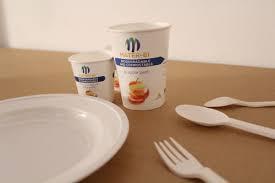Bioplastic foodservice ware, mulch film and packaging make plastic waste recycling more circular
Novamont, an Italian bioeconomy pioneer, is a global leader in the production of biodegradable and compostable bioplastics that are used to manufacture products in different sectors, including packaging, foodservice and agriculture.
The compostable foodservice products can greatly simplify waste management in closed loop systems, such as the catering and hospitality sectors, as these can be collected with the organic materials they're used for, and jointly recycled into biogas and compost.
These products increase recycling but also reduce waste management costs, as waste disposal facilities usually charge less for sorted food waste than for unsorted food-contaminated plastic waste.
In the agricultural sector, MATER-BI applications biodegradable in soil increase productivity as they do not need to be removed and disposed of at the end of crop life, but can be ploughed into the soil where they biodegrade, thus simplifying the management and reducing the amount of plastic waste.
As regards packaging, MATER-BI compostable resins can be used in a wide variety of applications, including bags, pouches, sealing films, cling film plus ridged pots and trays.
The use of biodegradable and compostable foodservice ware means a reduction of about 50% in CO2 emissions and of about 15% in water footprint.
In agriculture, the overall reduction of the potential impacts when using biodegradable mulch films instead of traditional ones, calculated as against the average Italian scenario for end-of-life plastic materials, varies from 25% up to 80%.
The use of biodegradable material eliminates all costs associated with the removal and disposal of mulch film at the end of the crop cycle.
In packaging, bioplastic materials can also be an option for packaging articles to help return any remaining food waste contents for composting, as opposed to landfill or incineration.

